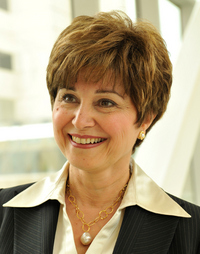Low enrollment in clinical trials is hampering progress
Clinical trials — studies in which people partner with doctors — are the crucial link between discoveries made in labs and applying them in doctors' offices. They are the very foundation on which progress is made, but lagging enrollment is hampering progress.

Dr. Maha Hussain
University of Michigan

Dr. Laurence Baker
SWOG
Yet, as never before, the need to increase the number of clinical trial participants has taken on new urgency because, in the last decade, scientists have gained unprecedented knowledge in what drives cancer, and they stand on the precipice of making significant life-saving strides.
Dr. Maha Hussain, professor of internal medicine and urology and associate director of clinical research at of U-M, says that there are several challenges to overcome in order to increase participation, but for patients, she cites access as the major barrier and tells me that many patients are unaware that a trial may be an option.
While some patients are reluctant to participate in trials even if they know about them, others are never offered the opportunity. A recent study in the Journal of the National Cancer Institute suggests that may be because doctors don't tell them.
There are many reasons why doctors fail to mention trials, but part of the problem is financial. Physicians who don't participate in clinical trials must refer their patients away, so each referred patient is a lost revenue stream.
Even physicians who do participate in clinical trials often lose money by participating, and it's becoming harder to justify shortfalls. The reality is that physicians must support their practices in order to keep their doors open.
And there are administrative costs to running clinical trials. About half of the trials in the U.S. are funded by government agencies (primarily NCI - The National Cancer Institute), but they pay only one third of the actual administrative costs, according to Dr. Laurence Baker, professor of internal medicine and pharmacology at U-M and chair of the Southwest Oncology Group, one of 10 cooperative groups funded by NCI. Dr. Baker then tells me that pharmaceutical companies pay two and one half times the administrative costs.
And this is having an influence on physician participation in clinical trials. A recent survey by the American Society of Clinical Oncologists (ASCO) found that one third of the U.S. and Canadian cooperative group sites plan to limit their participation in NCI funded trials because of inadequate reimbursement.
About 40 percent of those are planning to increase participation in trials that are funded by the pharmaceutical industry, but some expressed concern that subtle biases are built into industry funded trials.
The fact is, industry-sponsored trials are conducted largely to gain approval for a new drug. Conversely, government funded trials are conducted to answer medical questions.
Does this really matter to patients? Well, yes.
If we recognize reimbursement as a potential barrier to access, then we can't automatically assume that we know all our options. A clinical trial may be one we don't hear about.
Dr. Hussain suggests that patients can initiate a conversation with their physician by asking if a clinical trial might be appropriate. Only by knowing all of our options can we truly make informed decisions.
There's another financial problem that affects patients much more directly: insurance. While some states have mandated coverage of clinical trials, coverage varies wildly from state to state and even from policy to policy.
Many who want to participate in trials have found that their insurance doesn't cover the cost or enough of the cost, leaving patients without access to potentially better treatments and overall, halting progress.
Take, for example, a trial here at Michigan which is attempting to turn chronic myelogenous leukemia (CML) from a chronic disease into one that is curable. It combines an FDA-approved drug with Gleevec, a standard treatment which, taken daily, keeps CML under control, but at a cost of around $5,000 per month. If this combination works — and there is great hope that it will — CML patients can get off all drugs and be cured.
This looks like a win-win for patients and insurers — imagine the savings! But insurers didn't see it that way. They refused to cover the cost of the second drug and the trial was halted. I guess they were perfectly happy to spend $5,000 per month per patient — indefinitely. Does this seem as short-sighted to you as it does to me?
The good news is that the manufacturer of the second drug agreed to donate the drug to participating patients, and the trial recently re-opened. Hooray for Merck.
Insurance issues will not be solved overnight, but a provision in the Patient Protection and Affordable Health Care Act mandates insurers to cover costs for participating in clinical trials beginning in 2014, but it still falls short of mandating coverage of all expenses, and given the current political climate, it's anybody's guess what will happen to the law between now and then.
Meanwhile, there are currently 11,529 cancer clinical trials that are recruiting patients. Some are evaluating new treatments, combinations of drugs, or doses. Others are searching for better ways to diagnose or prevent the disease. And still others are searching for ways to improve quality of life, such as reducing side effects.
Unfortunately, some of these trials will never enroll a single patient, and others won't enroll enough to complete the trial. In fact, approximately 40 percent of trials are never completed because they can't enroll enough patients.
We should be outraged. On average, it takes 2-1/2 years to get a trial from concept to opening it to patients — and no, I'm not going to expound on the bureaucratic changes that should be made to shorten the time. What matters is that time and money and potential progress are going to waste. This has to change if we are ever going to benefit as quickly as scientific advances are being made.
The question is how? As patients, we can't solve the regulatory hurdles or reduce the astronomical expense of trials or change the financial incentives. But we can educate ourselves about clinical trials and consider one if it's appropriate. Not everyone will want to. Not everyone can. Not everyone will qualify.
But it's worth getting the facts because individually, a clinical trial may increase your options and offer access to new treatments before they are widely available. And collectively, we patients stand to gain the most from medical progress. And progress can only keep pace with discoveries when enough of us participate in clinical trials.
Next Friday, April 22: Clinical Trials: Facts and Finding
Previous installments of Candid Cancer are archived here.
Betsy de Parry is the author of The Roller Coaster Chronicles, a book about her experience with cancer and the shorter, serialized version she wrote for annarbor.com. Find her on Facebook or email her.

